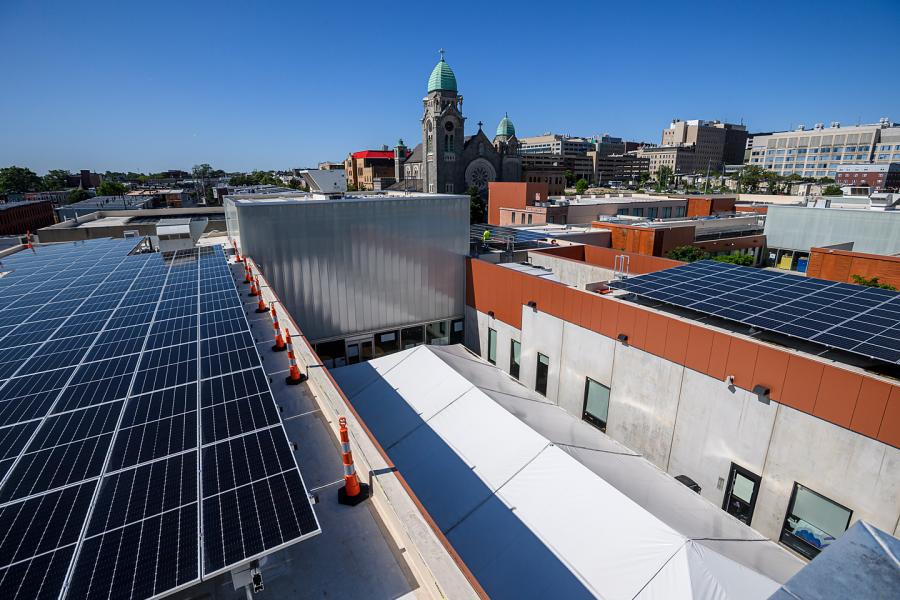In the modern world, sustainable energy is more important than ever. Johns Hopkins University views combating the climate crisis not only as the responsible choice but as an obligation to the global community. Hopkins is committed to ambitious and meaningful action that will reduce greenhouse gas emissions, adapt to a changing climate, and educate students and employees about the impacts and causes of climate change.
To help reach its sustainability goals, JHU has partnered with Neighborhood Sun, a local certified B Corporation and community solar company, to provide JHU community members living in Maryland with access to solar savings and an energy source that's healthier than fossil fuels through the state's Community Solar Program. Since the partnership was launched in 2023, 127 JHU community members have switched to solar through the partnership. In 2024, community solar education efforts continue, and new projects are available.
Many people who want to support renewable energy are unable to do so because of barriers such as upfront costs and requirements on homeownership, location, and shade. As the missing link to an equitable clean energy transition, community solar addresses these barriers to make solar energy accessible to anyone who pays an electric bill.
In 2021, the National Community Solar Partnership set a goal of powering the equivalent of 5 million households and creating $1 billion in energy savings by 2025 through community solar programs. Currently, 42 states are home to at least one community solar project, and 22 states plus Washington, D.C., are establishing policies to support their adoption.
JHU has partnered with Neighborhood Sun to help its community understand the details of this opportunity to support local solar projects while saving money in the process.
How does community solar work?
Customers subscribe to a local solar farm to receive a share of the project's energy at a discounted rate in the form of community solar credits. The solar panels generate power, and subscribers receive credits that reduce their utility bills.
Where are the community solar farms?
Neighborhood Sun manages a variety of community solar farms across its home state of Maryland plus six elsewhere. To subscribe to a community solar farm, you must be in the same utility region as the farm, so signing up allows you to support local small-scale renewable energy projects in your community.
New projects that have availability include Free Rein Community Solar Farm, which resides on an unused portion of a horse farm and services subscribers in the Potomac Electric Power Company (PEPCO) area in addition to covering 100% of the horse farm's electricity needs.
The Henderson-Hopkins School in East Baltimore is the site of another recent project, thanks to a partnership that includes the Climate Access Fund. The Solar4Us @ Henderson-Hopkins rooftop community solar farm will provide the school's lower-income community members and nearby neighbors with access to clean energy and a 25% discount in addition to covering the school's energy needs. [Read more here.] This project is part of a growing movement to use empty rooftop space in urban areas that have limited available open land.
Do I save money by signing up for community solar?
Yes. Neighborhood Sun guarantees savings on the community solar credits you receive for up to 25 years. Savings can vary between 10% and 30%, depending on project availability and income qualifications. Neighborhood Sun has already passed on to its subscribers more than $6 million in savings on electricity bills.
Key benefits
By subscribing to community solar, you will:
- Save between 10% and 30% on monthly energy costs, depending on project availability and income qualifications
- Support locally produced clean energy
- Reduce carbon emissions
- Continue to use your current utility provider
- Pay nothing to enroll or to cancel with advance notice
- In addition, members of the JHU community who subscribe through JHU's partner page or use the promo code JHU-SUN during the sign-up process will receive a $100 gift card usable at more than 100 retailers and charities after they pay their first community solar invoice. The sign-up bonus will be distributed within three to four months of subscribing.
Where can I get more information?
If you live in Maryland and get your electricity through BGE, PEPCO MD, Potomac Edison, or Delmarva Power & Light, you can subscribe to community solar to start saving money and fighting climate change with every electric bill. Visit neighborhoodsun.solar/JHU to learn more.
If you have questions or need help subscribing, email subscribe@neighborhoodsun.solar.
Posted in Benefits+Perks
Tagged hr-newswire








